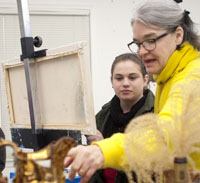Why I Give: Q&A With Jane Meredith Wolf ’61

Jane Meredith Wolf ’61
Q: Tell us a little about your life today.
A: Color me grateful! Midland, Texas, has been home for 50 years, and I am grateful to be living on the campus of a fine retirement community right in Midland. I am grateful for good health so far, for early-morning water aerobics, for the parish family at my church and for longtime friends all over the country. Prior to COVID, I enjoyed traveling, including exceptional trips with College chums. My two precious daughters check on me by phone—and we try to get together whenever we can. That they are well and happy and in work that they enjoy is a HUGE reason I am grateful.
Q: What is your fondest memory from the College?
A: I am so grateful for the education I received at Randolph College. I was not an outstanding student, but I received an outstanding education. Lifelong friendships—and lifelong learning—have enriched my life.
Q: What is your favorite tradition?
A: It certainly isn’t middle-of-the-night fire alarms! The 1961 Helianthus has hilarious photos of many of us standing around outside, in our bathrobes and hair curlers.
Q: Why do you support the College with current and planned gifts?
A: Vita abundantior. The College, more than any other feature of my life, apart from my parents, has made my life richer and fuller than I can possibly describe. The College is in my monthly budget just like my church pledge, my Medicare supplemental insurance and the TV cable/internet bill.
Originally, I had in my will a gift to the College, which would have required handling by my daughters. My new plan is much more appealing. From my personal retirement account, I have established a separate retirement account for several charitable beneficiaries, including Randolph. The College will get a modest “windfall” at my death, and during my lifetime those disbursements I am now required to take (required minimum distributions, or RMDs as they’re called) will also flow to the College and the other beneficiaries of this new retirement account. This takes the matter entirely out of my estate, frees my daughters from any responsibility and lowers my taxable income each year by the amounts of the RMDs to charitable beneficiaries.
Q: Why is it important for people to give to Randolph?
A: A good reason to give, in my opinion, is the benefit to the donor. What a great feeling to realize that you are investing in the future of something much larger than yourself, that you are making good things possible for people you don’t even know. I am grateful to give what I can, knowing it will pay dividends way beyond the actual dollars.
Q: What advice would you give to a new graduate?
A: Expect to be surprised all your life by the ways the College continues to enrich your life. I love this comment by another alum: “With a liberal arts degree and a little nerve, you can do anything.” My four years at our College prepared me—and sustained me—in my professional life and in every volunteer enterprise in which I’ve participated, and now, at 82, enriches my retirement life.
Create a Rewarding Legacy
Like Jane, you can establish a gift that provides benefits for your loved ones and expresses love for your Randolph College experience. To learn more about opportunities that meet your needs and support the College’s future, contact The Planned Giving Office at 434-485-8050 or plannedgiving@randolphcollege.edu.

